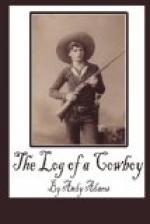When the fire had burned down sufficiently, the cooks got their respective utensils upon the fire; I had an ample supply of live coals for the Dutch oven, and dinner was shortly afterwards announced as ready. After dinner, Officer and I relieved the men on herd, but over an hour passed before we caught sight of the first and second guards returning from the Ford. They were men who could stay in town all day and enjoy themselves; but, as Flood had reminded them, there were others who were entitled to a holiday. When Bob Blades and Fox Quarternight came to our relief on herd, they attempted to detain us with a description of Frenchman’s Ford, but we cut all conversation short by riding away to camp.
“We’ll just save them the trouble, and go in and see it for ourselves,” said Officer to me, as we galloped along. We had left word with Honeyman what horses we wanted to ride that afternoon, and lost little time in changing mounts; then we all set out to pay our respects to the mushroom village on the Yellowstone. Most of us had money; and those of the outfit who had returned were clean shaven and brought the report that a shave was two-bits and a drink the same price. The town struck me as something new and novel, two thirds of the habitations being of canvas. Immense quantities of buffalo hides were drying or already baled, and waiting transportation as we afterward learned to navigable points on the Missouri. Large bull trains were encamped on the outskirts of the village, while many such outfits were in town, receiving cargoes or discharging freight. The drivers of these ox trains lounged in the streets and thronged the saloons and gambling resorts. The population was extremely mixed, and almost every language could be heard spoken on the streets. The men were fine types of the pioneer,—buffalo hunters, freighters, and other plainsmen, though hardly as picturesque in figure and costume as a modern artist would paint them. For native coloring, there were typical specimens of northern Indians, grunting their jargon amid the babel of other tongues; and groups of squaws wandered through the irregular streets in gaudy blankets and red calico. The only civilizing element to be seen was the camp of engineers, running the survey of the Northern Pacific railroad.
Tying our horses in a group to a hitch-rack in the rear of a saloon called The Buffalo Bull, we entered by a rear door and lined up at the bar for our first drink since leaving Ogalalla. Games of chance were running in the rear for those who felt inclined to try their luck, while in front of the bar, against the farther wall, were a number of small tables, around which were seated the patrons of the place, playing for the drinks. One couldn’t help being impressed with the unrestrained freedom of the village, whose sole product seemed to be buffalo hides. Every man in the place wore the regulation six-shooter in his belt, and quite a number wore two. The primitive law of nature known as self-preservation,




